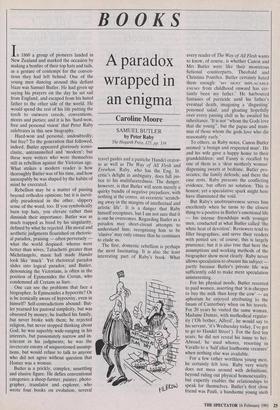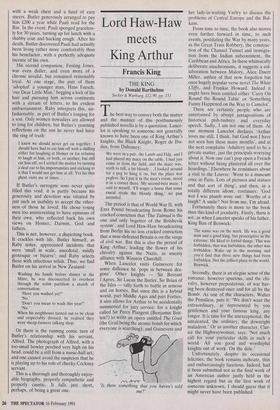BOOKS
A paradox wrapped in an enigma
Caroline Moore
SAMUEL BUTLER by Peter Raby In 1860 a group of pioneers landed in New Zealand and marked the occasion by making a bonfire of their top hats and tails, as a gesture of contempt for the conven- tions they had left behind. One of the young men dancing around this defiant blaze was Samuel Butler. He had given up saying his prayers on the day he set sail from England, and escaped from his hated father to the other side of the world. He would spend the rest of his life putting the torch to outworn creeds, conventions, mores and pieties; and it is his 'hard-won, free and personal vision' that Peter Raby celebrates in this new biography.
Hard-won and personal, undoubtedly; but free? To the generation that followed, indeed, Butler appeared gloriously icono- clastic, untrammelled and `modern'; but these were writers who were themselves still in rebellion against the Victorian age. What strikes a modern reader is how thoroughly Butler was of his time, and how inescapably he was shaped by the habits of mind he execrated.
Rebellion may be a matter of passing beyond orthodox opinions; but it is inevit- ably paradoxical in the other, slippery sense of the word, too. If you symbolically burn top hats, you elevate rather than diminish their importance. Butler was as much trapped as freed by his singularity, defined by what he rejected. His moral and aesthetic judgments flourished on rhetoric- al paradox, praising — often perversely — what the world despised: whores were better than wives, Tabachetti greater than Michelangelo, music hall made Handel look like 'muck'. Yet rhetorical paradox slides into logical paradox; and Butler, denouncing the Victorians, is often in the position of Epimenides the Cretan, who condemned all Cretans as liars.
One can see the problems that face a biographer. Is Epimenides a hypocrite? Or is he ironically aware of hypocrisy, even in himself? Self-contradictions abound: But- ler yearned for pastoral simplicity, but was obsessed by money; he loathed his family, but never broke with them; he rejected religion, but never stopped thinking about God; he was superbly wide-ranging in his interests, but passionately narrow and in- tolerant in his judgments; he was the inveterate enemy of unquestioned assump- tions, but would refuse to talk to anyone who did not agree without question that Homer was a woman.
Butler is a prickly, complex, unsettling and elusive figure. He defies conventional categories: a sheep-farmer, painter, photo- grapher, translator and explorer, who wrote four books on evolution, several The Hogarth Press, .£25, pp. 334
travel guides and a pastiche Handel orator- io as well as The Way of All Flesh and Erewhon. Raby, who has the Eng. lit. critic's delight in ambiguity, does full jus- tice to his multifacetedness. The danger, however, is that Butler will seem merely a quirky bundle of negative prejudices, with nothing at the centre, an eccentric 'scratch- ing away in the margins of intellectual and artistic life'. It is a danger that Raby himself recognises, but I am not sure that it is one he overcomes. Regarding Butler as a paradox may short-circuit attempts to understand him; recognising him to be 'elusive' may only ensure that he continues to elude us.
The first, domestic rebellion is perhaps the most fascinating. It is also the least interesting part of Raby's book. What
every reader of The Way of All Flesh wants to know, of course, is whether Canon and Mrs Butler were like their monstrous fictional counterparts, Theobald and Christina Pontifex. Butler certainly hated them enough: 'MY MOST IMPLACABLE ENEMY from childhood onward has cer- tainly been my father.' He harboured fantasies of parricide until his father's eventual death, imagining a 'disgusting' poisoned salad, and gloating hopefully over every passing chill as he awaited his inheritance. It is not "whom the Gods love that die young", but the papas and mam- mas of those whom the gods love who die reasonably early.'
To others, as Raby notes, Canon Butler seemed 'a benign and respected man'. He and his wife gave a happy home to their grandchildren; and Fanny is recalled by one of them as a 'dear motherly woman' dispensing sweets at bedtime. Butler pro- secutes; the family defends; and there the case rests. Raby presents the conflicting ' evidence, but offers no solution. This is honest; yet a speculative spark might here have illuminated the void.
But Raby's unobtrusiveness serves him excellently when he turns to the closest thing to a positive in Butler's emotional life — his intense friendships with younger men, conducted at what Butler called 'the white heat of devotion'. Reviewers tend to fillet biographies, and serve their readers with potted sex: of course, this is largely prurience; but it is also true that here the assumptions and working methods of the biographer show most clearly. Raby never allows speculation to obscure his subject — partly because Butler's private life was sufficiently odd to make mere speculation uninteresting.
For his physical needs, Butler resorted to paid women, asserting that 'it is cheaper to buy the milk than keep the cow' — an aphorism he enjoyed attributing to the Imam of Canterbury when on his travels. For 20 years he visited the same woman, Madame Dumas, with methodical regular- ity (`Oh bother, Alfred', he would say to his servant, 'it's Wednesday today, I've got to go to Handel Street'). For the first ten years, he did not reveal his name to her. Abroad, he used whores, resorting in Varallo to a 'half idiot loathsome creature' when nothing else was available.
For a few rather worthless young men, he certainly felt love. Raby very wisely does not mess around with definitions, beyond ruling out physical homosexuality, but expertly enables the relationships to speak for themselves. Butler's first close friend was Pauli, a handsome young snob with a weak chest and a fund of easy sneers. Butler generously arranged to pay him £200 a year while Pauli read for the Bar. In the event, Pauli sponged graceless- ly for 30 years, turning up for lunch with a shabby coat and hacking cough. After his death, Butler discovered Pauli had actually been living rather more comfortably than his benefactor, with a perfectly adequate income of his own.
His second companion, Festing Jones, was even duller, and even more of a chronic invalid, but remained reasonably loyal. At one stage, the pair of them `adopted' a younger man, Hans Faesch, `our Dear Little Man,' begging a lock of his hair and pursuing him across continents with a stream of letters, to his evident embarrassment. Raby interprets this, un- fashionably, as part of Butler's longing for a son. Only women nowadays are allowed to long for children; but Butler's yearning reflections on the son he never had have the ring of truth:
I knew we should never get on together; I should have had to cut him off with a shilling either for laughing at Homer or for refusing to laugh at him, or both, or neither, but still cut him off, so I settled the matter by turning a deaf ear to his importunities and sticking to it that I would not get him at all. Yet his thin ghost visits me at times. . .
If Butler's surrogate sons never quite filled this void, it is partly because his generosity and devotion was vitiated by just such an inability to accept the other- ness of those he loved. He chose young men too uninteresting to have opinions of their own, who reflected back his own views on Homer, Darwin, God and fathers.
This is not, however, a dispiriting book. It crackles with life. Butler himself, as Raby notes, appreciated incidents that were 'small in scale, anecdotal, mildly grotesque or bizarre'; and Raby selects these with infectious relish. Thus, we find Butler on his arrival in New Zealand:
Washing his hands before dinner at the Mitre, he was disconcerted to overhear through the scrim partition a snatch of conversation: 'Have you washed yet?'
`No.'
'Don't you mean to wash this year?' `No.'
When his neighbours turned out to be clean and respectably dressed, he realised they were sheep-farmers talking shop.
Or there is the running comic turn of Butler's relationship with his servant, Alfred. The photograph of Alfred, with a too-small bowler perched very high on his head, could be a still from a music-hall act; and one cannot avoid the suspicion that he is playing up to his role of cheeky Cockney servant.
This is a thorough and thoroughly enjoy- able biography, properly sympathetic and properly caustic. It falls just short, perhaps, of being a great one.



















































 Previous page
Previous page